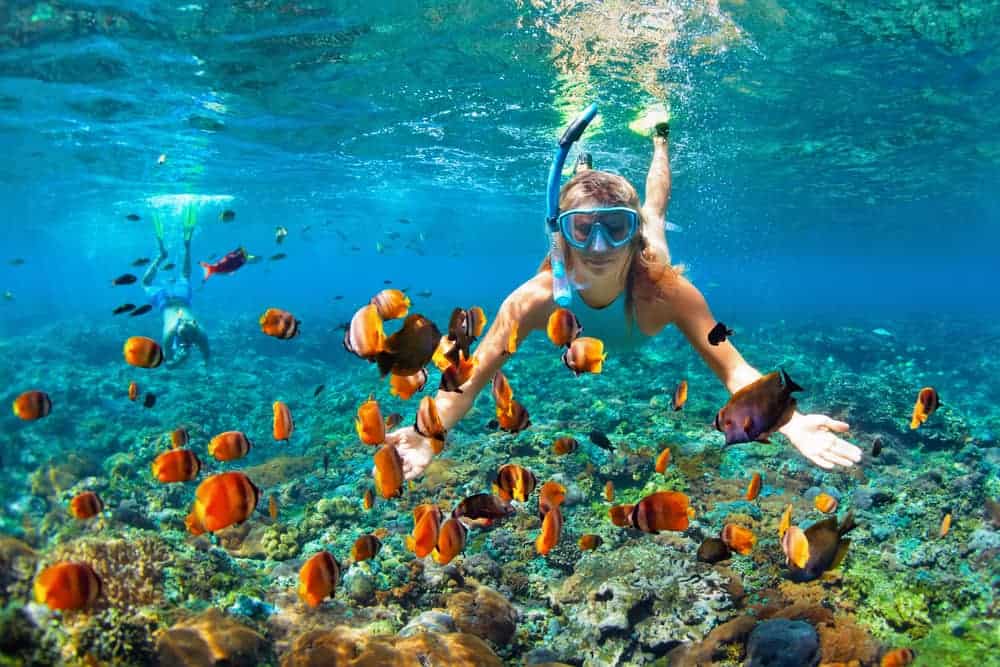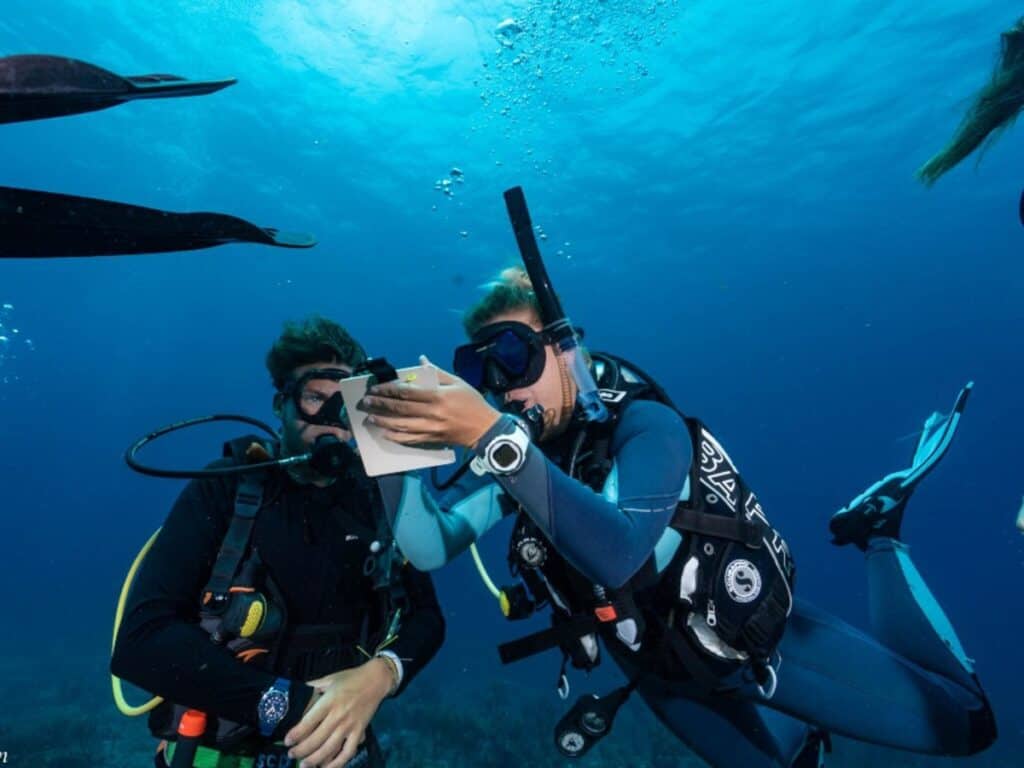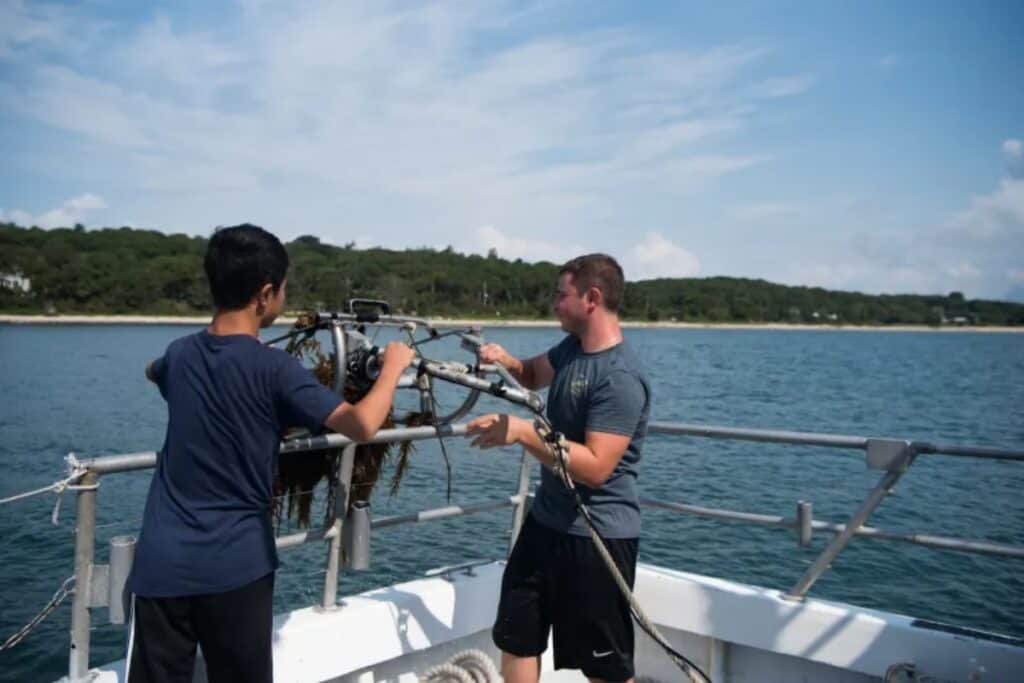
Summer programs are a way for students to maintain their academic practices, get an edge when they come back from summer break, and prepare for college courses. Marine biology summer camps, in particular, provide an excellent opportunity for students to satisfy their thirst for knowledge and adventure.
Your children can explore, study, and learn about the fascinating organisms that make their home below the waves and the environment that surrounds them. At the same time, they can also enjoy fun activities like scuba diving, snorkeling, sailing, and more.
Here are some amazing marine biology summer camps and programs where kids can get a top-notch science education before college.
Best Marine Biology Summer Camps
1. Sail Caribbean
Sail Caribbean offers an introductory course to marine biology for ages 11-18. With their overnight programs in the beautiful Caribbean waters and ecosystems of the British Virgin Islands, students will experience hands-on learning from their onboard marine biologists.
Students can explore the coral reefs and mangroves of the islands as well as study the local marine life up close in person with scuba dives. Apart from the 2-4 weekly hands-on seminars and workshops by their professional staff of marine biologists, campers can enjoy night scuba dives, beach scenery, and other fun watersports.
The best part is that students can earn academic credits as they participate in research projects and field studies. They also have service hours you can complete. Sail Caribbean offers educational adventures that your child will remember forever.

2. New Logic Marine Science Camp
New Logic hosts several marine science camps with locations scattered across the coast. While each option is slightly different, they serve the same purpose of helping campers discover more about ocean life.
The camp’s curriculum combines learning with thrilling interactive games to provide an all-around experience. The summer programs are designed to provide a hands-on, feet-wet approach to outdoor education. Students can expect lessons on biology, chemistry, and conversation with activities like water sampling, organism identification, kayaking, science experiments, and more.
You can sign children up for camps in states like Delaware, Florida, Maine, Maryland, New Hampshire, and New Jersey. Most of these locations offer full-day camps with some half-day options available. They keep a low instructor-to-student ratio to ensure your kids get all the attention they need.
3. Texas A&M Sea Camp
Texas A&M Sea Camp offers a week-long camp experience that lets kids ages 10-18 work with high-quality equipment and facilities to learn about marine creatures in their coastal environments.
From local beaches to salt marshes, students can immerse in endless fun and knowledge right from when the program begins until it ends. There are different camps they can choose from depending on age, focusing on oceanography, fishing, sea photography, marine conservation, and more. Students can learn about many kinds of marine animals, including sharks, dolphins, and crabs, all while exploring coral reefs and beaches plus enjoying fun field trips.
There is also a day camp for younger campers ages 4-11 with full-day and half-day programs available. Students are supervised by knowledgeable staff to help them throughout their time at camp.
4. Project Oceanology Summer Camp
At Project Oceanology camp, children can deepen their knowledge of ocean life by putting into practice all they learn. You can choose from several overnight camps with different focuses, like marine science research, ocean exploration, undersea technology, and more.
Located in Groton, Connecticut, the STEM summer camps tend to last a week, with multiple sessions available for each focus. Students are taught and mentored by experienced marine scientists. Children will perform research, conduct interesting experiments, learn to navigate the sea, measure and analyze ocean conditions, collect and analyze plant samples, plus much more.
Day camps run from Sunday-Friday while overnight camps are available Monday-Friday. Consider registering early, as spots get taken up fast. Students in grades 5-12 are welcome to apply.
5. Tabor Academy Marine Science Camp
Located on an 85-acre seaside property in Marion, Massachusetts, Tabor Academy boasts one of the leading marine biology summer camps. They offer a host of activities to keep campers occupied throughout the duration of the program. From swimming to snorkeling, kayaking, and more, your kids can have a memorable time while continuing their science education.
While water activities are a huge part of the fun, the educational side includes research projects, identifying sea life, learning sampling techniques, and more. Tabor Academy Summer Camp is open to middle school and high school students in grades 8-12 and runs from 8 am to 5:00 pm. Parents can choose to keep kids at the day camps for 1 or 2 weeks.
There is also a more general summer camp for kids ages 6-15 that includes sports and STEM activities like archery, chess, coding, digital photography, volleyball, and more.

6. Sea Education Association (S.E.A.) Expedition
The S.E.A. Expedition is a two-week immersive experience in seafaring marine biology. High school students spend the first three days on campus, getting to know the other kids and staff, learning the basics of the jobs they will perform and how to sail. The remaining days are spent at sea, where students get hours of continuous activity and learning.
Participants are divided into 8-person teams and assigned day and night shifts. During their ocean adventure, students learn to sail tall ships, create and maintain sanctuaries, and conduct oceanographic research. This unique experience gives high school students the chance to build leadership skills, improve self-esteem and confidence, while also making new friends.
There is a total of three sessions available during the summer months, each lasting around two weeks. The Sea Education Association also offers a SEASCape program where students stay in cabins at the Woods Hole campus in Massachusetts. Students learn the basics of oceanography and visit museums, labs, and research facilities.
There is also the S.E.A. Pre-College: Ocean Sciences in Woods Hole, where they focus on the interplay between the global patterns above and below the seas. They explore topics like ocean policy, marine biodiversity, and ocean engineering.
7. Marine Biology Camp at Roger Williams University
The program is located in Bristol, Rhode Island, and offers sea kayaking, snorkeling, and boat trips on top of the academic rigors of laboratory experiments, sample collecting, and guest seminars. Students can learn everything from sampling techniques to organism identification and conducting experiments.
Roger Williams University’s convenient location in Rhode Island offers an amazing place to study different marine habitats that are hard to find elsewhere. Students also go on research vessels to survey the surrounding areas.
This summer camp is aimed at high school students 14 and up with at least one biology class under their belt. They only allow a small group of students each summer, so it’s best to apply as early as possible.
8. Virginia Western University Marine Science Program
The VWU Marine Science Summer Program is designed for college students in a science-related major. Located in Chesapeake Bay, Virginia, students live on campus during the summer and take courses at VWU for school credits while exploring the surrounding areas as part of their education.
Throughout the 6-week program, students experience the rigors of working in the field of marine biology while taking classes. They take trips around the bay and along the east coast of the U.S. to collect samples and conduct research. Attendees can make use of the universities labs, research vessels, and top-of-the-line facilities for research and learning purposes.
This is a university-level program for students who are already in college. Some participants will also get the chance to see and work with sea turtles, seals, and dolphins.
9. Eckerd College Marine Science
The Eckerd College Pre-College Marine Science camp is an affordable yet highly educational experience. Students stay on the college’s campus in St Petersburg, Florida. During the day, the kid’s time is packed with hands-on activities indoors and outdoors.
This includes things like identifying sharks and fish at sea, data analysis, marine life photography, studying the ecosystems, examining organisms under a microscope, and much more. The participants are guided and mentored by the college faculty and staff, which consists of professors, marine biologists, and graduate students. They also get an insight into marine chemistry and marine geology through their learning.
The camp is modeled after Eckerd College’s very own marine biology program and is intended for rising high school students in 10th to 12th grade interested in the natural sciences.

Leave a comment